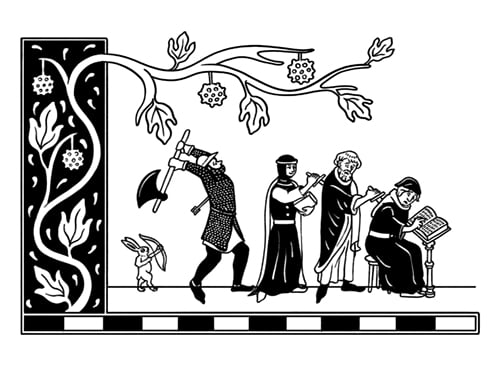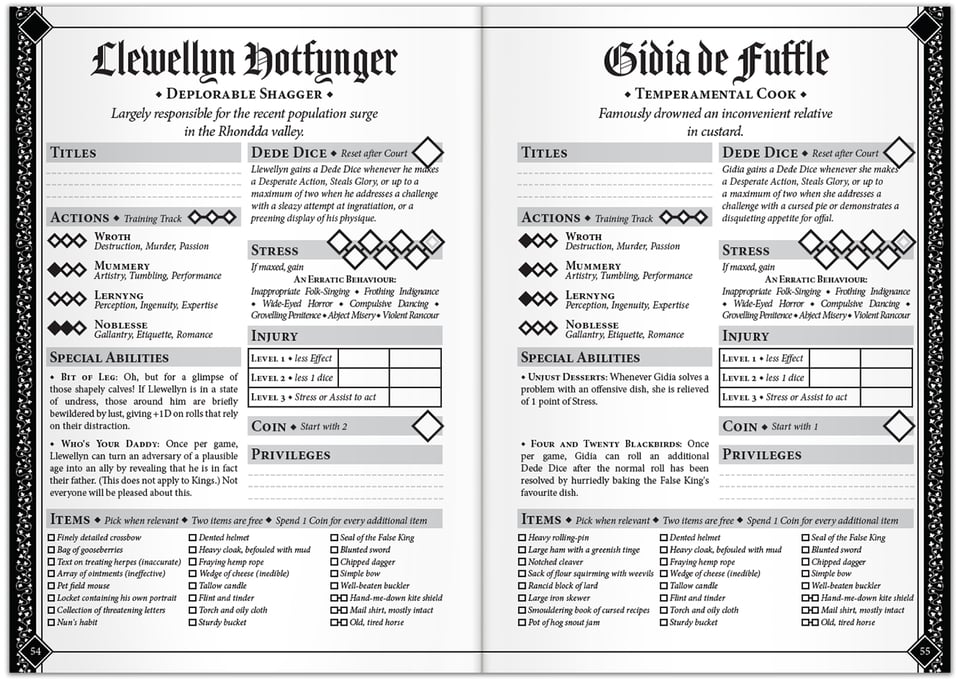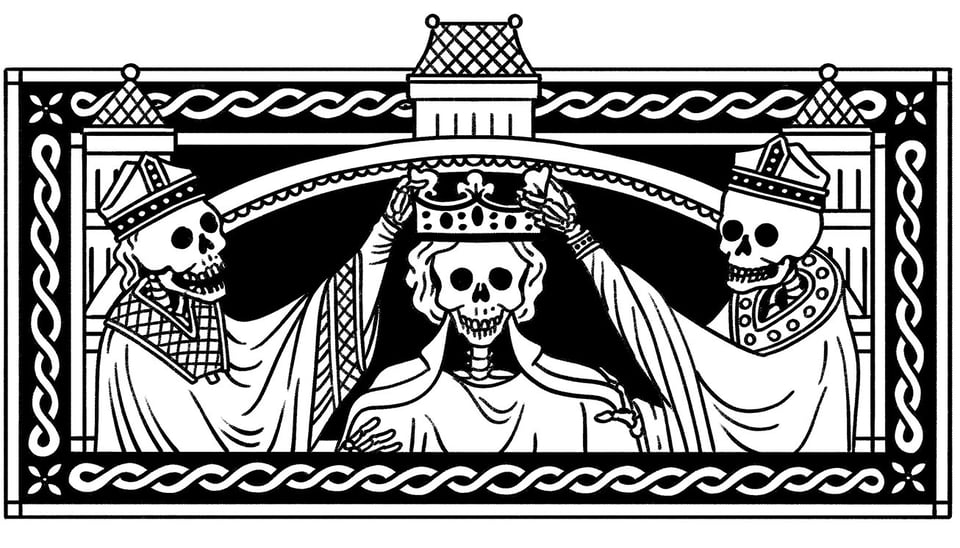A Confection of Tropes Largely Popularised in the 19th Century
Welcome to the TEETH newsletter, a near-weekly transmission about our adventures in the very secret land of Tabletop Roleplaying-Games. We have published a whole series of our own TTRPGs! More games are coming soon. And we shall play many others, and then report on those experiences right here, too.
This newsletter is written and compiled by clerical ombudsman, Jim Rossignol, and ecumenical manciple, Marsh Davies. Come and join us over on the TEETH Discord. Free tooth emojis for everyone!
And hey, please do BUY OUR BOOK. (If you haven’t already. You probably have. Thank you.)

Hello, you.
Links!
Staying True to the Times: Historical Setting In False Kingdom
Hello, you.
It’s been a busy time over here at TEETH towers. Marsh and Jim have both been working on new game stuff, and Marsh has both art experimentations in the pipeline for forthcoming adventures and RPG systems stuff to make pirates sing (perhaps literally). It’s exciting stuff.
Thank you to everyone who shared, purchased, played or mentioned FALSE KINGDOM, we had enormous fun making it, and we’re now seeing that percolate through the community, with some very good vibes.
If you’re enjoying our games, or just want to ask questions about them, then swing by the Discord. It’s quiet, but no one will bite (despite the name.)
The essay this week is from Marsh, talking about how we invented False Kingdom’s medieval setting while wrestling with an intense sense of pedantry.
Love,
Marsh & Jim
LINKS!
THING OF THE WEEK: I am not really sure why I like this so much, I just find it to be an astonishing premise for a (successfully funded!) book: “Fungi of the Far Realms is an illustrated guide to fictional mushrooms, both magical and mundane, compatible with all role-playing game systems… the book and accompanying deck of flash cards is packed with over 200 characterful fungi accompanied by traditionally made watercolour paintings.” Ludicrous! And such a compelling idea. Why yes, we DO need more totally invented fungi. And here it is.
The other thing we couldn’t help noticing this week was an interview with Warhammer-leavers Louise Sugden and Chris Peach over on Polygon, in which they set out their plans for a new actual play series called Heretic Hunt. This project is based on a Warhammer 40k hive city setting and it’s as ambitious and as lovely-looking as you’d expect from these impressively creative folks, with miniatures and battle maps setting the scene. I particularly like the decision to edit footage down to 45-minute episodes, which sounds like a fucking nightmare for whoever has to do the editing, but would make them actually watchable by time-starved Jim Rossignols. The bit that elicited gasps from across the indie RPG community (myself included), however, was this: “D&D is maybe the shared language that the majority of RPG players have… What I found was that the efficiency of D&D is what made it great for a storytelling medium with a mind for an audience. Those [other] RPGs are spectacular for playing with your friends. But for me, and my experience of D&D, that made it a lot more efficient for me to tell stories on camera when we were filming it. So it was [equal parts] love of the game [as it was] a bit of practicality.” Yeah. Look, I absolutely get the decision path that led to this: they want as many viewers as possible, and D&D is the behemoth of the actual play scene which allows the maximum number of people to understand what’s happening. But… I mean, I don’t really need to fill that in, do I? The efficiency of D&D to tell stories? Sceptical noises. Not to mention the neglect of perfectly good Warhammer RPGs in favour of Games Workshop’s rival. I get it. I really do. But.
Meanwhile, a number of you have asked whether Quinns was going to feature TEETH on his video channel, and the answer is no, but he nonetheless did an extensive post highlighting why “it is unquestionably worth buying TEETH”. So that’s nice of him. Also featured in the “beloved but not reviewed category was Swyvers, Luke Gearing’s city-generating game of heists and gangs. It sounds amazing -- perhaps you might want to give it a look.
Ken Lowery invented #PaidRPGDay over on BlueSky, and rightly so. Let’s give our creative friends enough to buy a few fancy coffees, and perhaps an avocado.
I haven’t actually read zinest-lookin’ zine Blister City, but its author describes it as “another fucking banger”, and I sure do like that assertiveness. “The folks who ruined Mars have names and addresses. You have a crowbar, and a dream. Make them pay.” It even sounds like a banger.
Eco Mofos, a Mark Of The Odd “hopecrawl” game, seems to have been arriving in people’s post boxes, thanks to the work of the postman and also likely due to author David Blandy. There’s also add-on adventures, To Put Away A Sword, with the cover flash “Dying Mecha” - you don’t see that in enough supermarkets - and Into the Antlion’s Den, which sounds like something you should never do.
Research this week is… well, Marsh covers it extensively, in this week’s essay.
Staying True to the Times
A while back, on the excellent Shining Moon podcast, we mulled over the challenge of making (even vaguely) historically accurate TTRPGs. Well, False Kingdom is our first foray into medievalism—specifically, the chaos of the 12th century—and it's been an interesting experience figuring out how to convey this time period in an authentic way, while keeping the game relatively easy for players to parse. And by "figuring out" I mean that we totally failed, immediately gave up and instead wrote something full of anachronisms that is only slightly truer to the 12th century than your average Ren Faire capon-eating competition.

As a former medievalist and a current pedant, this is very annoying to me, but there really wasn't a good way around it if we wanted False Kingdom to be readable, comprehensible, and key into myths, tropes and expectations that have built up around the idea of medieval England. The truth is that the medieval period spans about a 1000 years and, in so doing, covers several eras that are hugely dissimilar, and what we think of as "medieval" is really a confection of tropes largely popularised in the 19th century by nationalist fantasists nostalgic for a merry olde England that, if it ever existed, really only starts to be vaguely recognisable in the 14th century. It's surprising just how much of what we think of as medieval simply doesn't exist before this period, from words, to types of food, to even the court jester we stuck on the cover of False Kingdom itself. Sure, there would have been entertainers and musicians and even professional idiots before that time, but the formal role of jester is a late import. Players aren't going to know what we are talking about if we start referring to the rough 12th century equivalent "gleemen" instead, though.
We can thank the French for this—the Norman invasion in 1066 led to a sea-change in the dominant culture, and it's from the emerging fusion of people and languages that we get what we think of as medieval England and even modern English today. Medieval writers after this period, like Chaucer and Shakespeare, remain more or less completely readable now, but pick up a text from a period prior to the Norman conquest and the average reader will recognise very little. Many of the letters themselves are different—which makes it hard to pepper our TTRPG with terms from the period.
By the time the 12th century comes round, things are still in flux. Old English is still transitioning into the more recognisable Middle English—but even that isn't spoken at court. There, the kings speak an archaic form of French. How do we communicate this in False Kingdom? Well, we don't, really, beyond a handful of inane French puns hidden in the Playbooks.

Should we have, at this point, simply moved the events of False Kingdom into the more recognisable 14th century? Probably. But there are a few things in the 12th century's favour. Firstly, the messy succession crisis of that period, accurately named The Anarchy, is a great backdrop for the sort of quavering loyalty and deluded pretenders that form the engine of False Kingdom's drama. Admittedly, there are many other examples of civil war and chicanery to pick from in English history, but there's something about the way The Anarchy explodes from a boating accident that renders it bloodily tragi-comic.
Secondly, there is a tension between families descended from the thwarted Anglo-Saxon nobles and the new-ish Norman rulers. This doesn't play out in an active way in False Kingdom, but it's there, bubbling beneath the text, in the names of characters, customs and places.
And thirdly, the 12th century is when the murky and weird Celtic stories of Arthurian legend transmute into the familiar tales of courtly romance and chivalric derring do—so when we riff on Arthurian tropes in False Kingdom, we are riffing on those 12th century ideas of what the 6th century was like. Or, really, we are riffing on 14th century versions of the 12th century ideas of the 6th century. Or the 15th century versions of the 14th century versions—each telling the stories with a different slant, each adding new details that quickly become firmly embedded in the myth from then on. And so on, through all the centuries in which Arthurian myths have been told and retold, until the recent incarnations—from Monty Python and the Holy Grail to A Knight's Tale.

So, really, if we want play with those mythic tropes of disquietingly horny, questing knights and equally horny, tower-dwelling maidens, and so forth, then the possibility of historical accuracy goes out the window: the shape these myths arrive in the current day is just as important as how they began. History isn't just a point in the past—it's how we got from there to here.
At least, that's what I'm telling my inner-pedant.
-Marsh
More soon! x
Add a comment: